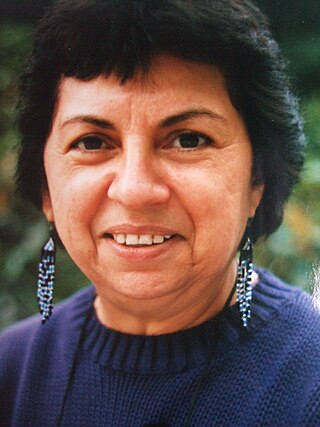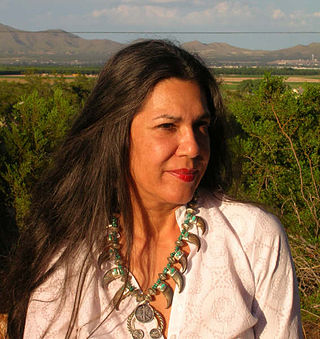
Chicano or Chicana is an ethnic identity for Mexican Americans who have a non-Anglo self-image, embracing their Mexican Native ancestry. Chicano was originally a classist and racist slur used toward low-income Mexicans that was reclaimed in the 1940s among youth who belonged to the Pachuco and Pachuca subculture. In the 1960s, Chicano was widely reclaimed in the building of a movement toward political empowerment, ethnic solidarity, and pride in being of indigenous descent. Chicano developed its own meaning separate from Mexican American identity. Youth in barrios rejected cultural assimilation into whiteness and embraced their own identity and worldview as a form of empowerment and resistance. The community forged an independent political and cultural movement, sometimes working alongside the Black power movement.

Cherríe Moraga is a Xicana feminist, writer, activist, poet, essayist, and playwright. She is part of the faculty at the University of California, Santa Barbara in the Department of English since 2017, and in 2022 became a distinguished professor. Moraga is also a founding member of the social justice activist group La Red Xicana Indígena, which is network fighting for education, culture rights, and Indigenous Rights. In 2017, she co-founded, with Celia Herrera Rodríguez, Las Maestras Center for Xicana Indigenous Thought, Art, and Social Practice, located on the campus of UC Santa Barbara.

Gloria Evangelina Anzaldúa was an American scholar of Chicana feminism, cultural theory, and queer theory. She loosely based her best-known book, Borderlands/La Frontera: The New Mestiza (1987), on her life growing up on the Mexico–Texas border and incorporated her lifelong experiences of social and cultural marginalization into her work. She also developed theories about the marginal, in-between, and mixed cultures that develop along borders, including on the concepts of Nepantla, Coyoxaulqui imperative, new tribalism, and spiritual activism. Her other notable publications include This Bridge Called My Back: Writings by Radical Women of Color (1981), co-edited with Cherríe Moraga.

Ana Castillo is a Chicana novelist, poet, short story writer, essayist, editor, playwright, translator and independent scholar. Considered one of the leading voices in Chicana experience, Castillo is most known for her experimental style as a Latina novelist and for her intervention in Chicana feminism known as Xicanisma.

Norma Elia Cantú is a Chicana postmodernist writer and the Murchison Professor in the Humanities at Trinity University in San Antonio, Texas.

The Comisión Femenil Mexicana Nacional was a Mexican-American organization dedicated to economically and politically empowering Chicana women in the United States.

Lourdes Portillo is a Mexican film director, producer, and writer.

Chicana feminism is a sociopolitical movement, theory, and praxis that scrutinizes the historical, cultural, spiritual, educational, and economic intersections impacting Chicanas and the Chicana/o community in the United States. Chicana feminism empowers women to challenge institutionalized social norms and regards anyone a feminist who fights for the end of women's oppression in the community.

Chicano poetry is a subgenre of Chicano literature that stems from the cultural consciousness developed in the Chicano Movement. Chicano poetry has its roots in the reclamation of Chicana/o as an identity of empowerment rather than denigration. As a literary field, Chicano poetry emerged in the 1960s and formed its own independent literary current and voice.

Alicia Gaspar de Alba is an American scholar, cultural critic, novelist, and poet whose works include historical novels and scholarly studies on Chicana/o art, culture and sexuality.
Roberta Fernández is a Tejana novelist, scholar, critic and arts advocate. She is known for her novel Intaglio and for her work editing several award-winning women writers. She was a professor in Romance languages & literatures and women's studies at the University of Georgia.
Angie Chabram-Dernersesian is a full professor at the University of California, Davis.

Borderlands/La Frontera: The New Mestiza is a 1987 semi-autobiographical work by Gloria E. Anzaldúa that examines the Chicano and Latino experience through the lens of issues such as gender, identity, race, and colonialism. Borderlands is considered to be Anzaldúa’s most well-known work and a pioneering piece of Chicana literature.

Chicana literature is a form of literature that has emerged from the Chicana Feminist movement. It aims to redefine Chicana archetypes in an effort to provide positive models for Chicanas. Chicana writers redefine their relationships with what Gloria Anzaldúa has called "Las Tres Madres" of Mexican culture by depicting them as feminist sources of strength and compassion.
This is a Mexican American bibliography. This list consists of books, and journal articles, about Mexican Americans, Chicanos, and their history and culture. The list includes works of literature whose subject matter is significantly about Mexican Americans and the Chicano/a experience. This list does not include works by Mexican American writers which do not address the topic, such as science texts by Mexican American writers.
Natasha Jiménez is a trans and intersex activist and author who is currently the General Coordinator for MULABI, Latin American Space for Sexualities and Rights, the first host of the Intersex Secretariat for ILGA. She is an advisory board member for the first intersex human rights fund and participated in the first intersex hearing on human rights before the Inter-American Commission on Human Rights.
Patricia Zavella is an anthropologist and professor at the University of California, Santa Cruz in the Latin American and Latino Studies department. She has spent a career advancing Latina and Chicana feminism through her scholarship, teaching, and activism. She was president of the Association of Latina and Latino Anthropologists and has served on the executive board of the American Anthropological Association. In 2016, Zavella received the American Anthropological Association's award from the Committee on Gender Equity in Anthropology to recognize her career studying gender discrimination. The awards committee said Zavella’s career accomplishments advancing the status of women, and especially Latina and Chicana women have been exceptional. She has made critical contributions to understanding how gender, race, nation, and class intersect in specific contexts through her scholarship, teaching, advocacy, and mentorship. Zavella’s research focuses on migration, gender and health in Latina/o communities, Latino families in transition, feminist studies, and ethnographic research methods. She has worked on many collaborative projects, including an ongoing partnership with Xóchitl Castañeda where she wrote four articles some were in English and others in Spanish. The Society for the Anthropology of North America awarded Zavella the Distinguished Career Achievement in the Critical Study of North America Award in the year 2010. She has published many books including, most recently, "I'm Neither Here Nor There, Mexicans"Quotidian Struggles with Migration and Poverty, which focuses on working class Mexican Americans struggle for agency and identity in Santa Cruz County.
Vicki Lynn Ruiz is an American historian who has written or edited 14 books and published over 60 essays. Her work focuses on Mexican-American women in the twentieth century. She is a recipient of the National Humanities Medal.

Emma Pérez is an American author and professor, known for her work in queer Chicana feminist studies.

The term Chicanafuturism was originated by scholar Catherine S. Ramírez which she introduced in Aztlán: A Journal of Chicano Studies in 2004. The term is a portmanteau of 'chicana' and 'futurism', inspired by the developing movement of Afrofuturism. The word 'chicana' refers to a woman or girl of Mexican origin or descent. However, 'Chicana' itself serves as a chosen identity for many female Mexican Americans in the United States, to express self-determination and solidarity in a shared cultural, ethnic, and communal identity while openly rejecting assimilation. Ramírez created the concept of Chicanafuturism as a response to white androcentrism that she felt permeated science-fiction and American society. Chicanafuturism can be understood as part of a larger genre of Latino futurisms.













